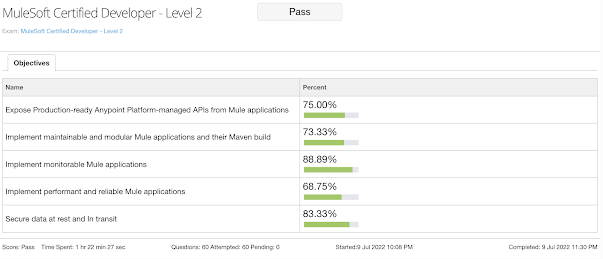Mulesoft Certified Developer-Level2 - Study Material
My Study Notes for Salesforce Certified Mulesoft Developer - Level2.
Go thru chapter wise (DataSheet) reference links for each topic provided below and make notes for quick reference.
Take Mulesoft Certified Developer Level2 Practice test provided by MuleSoft training as many times as possible @ https://training.mulesoft.com/certification/developer-mule4-level2/practice-exam
MCD Level2 - DataSheet
Ch1:Expose production-ready Anypoint Platform managed APIs from Mule applications
Implement versioning of specific API-related artifacts
Configure custom or out-of-the-box (OOTB) API policies
https://docs.mulesoft.com/gateway/policies-included-http-caching
https://docs.mulesoft.com/api-manager/1.x/json-xml-threat-policy
https://docs.mulesoft.com/gateway/policies-mule3-add-headers-policy#:~:text=Adds%20one%20or%20more%20headers,response%20from%20the%20backend%20service. https://docs.mulesoft.com/api-manager/2.x/spike-control-reference
https://github.com/mulesoft-labs/exchange-documentation-samples/tree/master/policy
https://docs.mulesoft.com/api-manager/2.x/custom-policy-4-reference#outbound-policies
https://docs.mulesoft.com/gateway/policies-custom-getting-started
Policy Template and Policy Definition are downloaded from API Manager to Runtime.
PolicyTemplate Contains:
Jar file - mule policy with template
YAML file - policy UI configuration elements and its configuration
Policy Definition:
XML file - Contains all configured values from the policy
JSON file - contains auto discovery api id , policy id and policy name etc.
Implement server-side caching of API invocations using API policies
Request access to an APIs while honoring environment- specific scoping
https://docs.mulesoft.com/exchange/to-request-access
Implement HTTP callbacks (webhooks)
Code API implementations to perform API auto-discoveryhttps://docs.mulesoft.com/gateway/mule-gateway-config-autodiscovery-mule4
https://docs.mulesoft.com/api-manager/2.x/configure-autodiscovery-4-task
Ch2:Implement maintainable and modular Mule applications and their Maven builds
Modularize and optimize Mule application Maven build configurations
https://docs.mulesoft.com/mule-runtime/4.4/using-maven-with-mule
https://www.baeldung.com/maven
https://maven.apache.org/guides/getting-started/maven-in-five-minutes.html
https://maven.apache.org/guides/getting-started/index.html
https://www.youtube.com/watch?v=tvhUV7uct68
https://stackoverflow.com/questions/4113697/in-maven-how-to-exclude-resources-from-the-generated-jar
Implement Maven based automated deployment to Mule runtimes
https://docs.mulesoft.com/mule-runtime/3.5/building-a-mule-application-with-maven-outside-studio
https://dzone.com/articles/mule-maven-plugin-for-deploying-mulesoft-applicati
https://docs.mulesoft.com/mule-runtime/4.4/deploy-to-cloudhub
Execute MUnit tests with Maven
https://docs.mulesoft.com/munit/2.0/munit-maven-plugin
Implement unit tests with the MUnit framework and tooling
https://docs.mulesoft.com/munit/2.2/munit-test-concept#munit-test-suite
https://docs.mulesoft.com/munit/2.3/assertion-event-processor
https://hackernoon.com/lets-talk-about-resilience-97051e14761f
Build custom API policies
https://docs.mulesoft.com/api-manager/2.x/custom-policy-4-reference
Encapsulate common Mule application functionality in libraries
https://msujoy-soa.medium.com/designing-reusable-libraries-in-mulesoft-eee50bd592d7
https://blogs.mulesoft.com/dev-guides/how-to-create-a-global-error-handler-in-mule-4/
https://docs.mulesoft.com/mule-runtime/4.4/error-handling#global_error_config_ref
Implement custom message processors using the Mule SDK or XML SDK
https://docs.mulesoft.com/mule-sdk/1.1/xml-sdk
https://www.youtube.com/watch?v=M0kju9qvjUg
https://www.youtube.com/watch?v=kjF9sF66EUc&t=391s
Ch3:Implement monitorable Mule applications
Expose health check endpoints from a Mule application
https://blogs.mulesoft.com/dev-guides/how-to-tutorials/how-to-check-service-health/
https://blogs.infomentum.com/apis-healthcheck-functional-monitoring-anypoint
https://dzone.com/articles/health-monitoring-of-mulesoft-application
https://docs.mulesoft.com/monitoring/dashboard-custom-config
Implement effective logging
https://www.bigcompass.com/blog/9-essential-laws-of-mulesoft-logging-success
https://docs.mulesoft.com/mule-runtime/4.4/logging-in-mule
https://blogs.mulesoft.com/dev-guides/how-to-tutorials/mulesoft-development-mule-4-logging/
https://docs.mulesoft.com/mule-runtime/4.4/logging-mdc
https://docs.mulesoft.com/web-service-consumer-connector/1.6/web-service-consumer-troubleshooting
Change log levels and aggregate and analyze logs
https://www.tutorialspoint.com/log4j/log4j_logging_levels.htm
https://help.mulesoft.com/s/article/How-to-pass-properties-to-the-Log4j-configuration-file
Monitor Mule applications and Mule runtimes using Anypoint Platform or external tools
https://docs.mulesoft.com/api-functional-monitoring/
Implement message correlation, including persistence and propagation of correlation IDs over HTTP
https://github.com/mulesoft-consulting/mule-correlation-custom-policy
https://docs.mulesoft.com/mule-runtime/4.4/correlation-id
Ch4:Implement performant and reliable Mule applications
Implement ObjectStore persistence for all Mule deployment options
https://docs.mulesoft.com/object-store-connector/1.2/
https://docs.mulesoft.com/object-store/osv2-apis
Implement fault-tolerant, performant, and traceable message passing with the VM and AnypointMQ connectors
https://docs.mulesoft.com/vm-connector/2.0/
https://docs.mulesoft.com/mq/mq-faq
https://docs.mulesoft.com/anypoint-mq-connector/3.x/anypoint-mq-listener
https://blogs.mulesoft.com/dev-guides/application-network-fault-tolerance/
https://docs.mulesoft.com/vm-connector/2.0/vm-reference#listener
Implement fault-tolerant invocations of HTTP-based APIs, reacting correctly to HTTP status codes
https://blogs.mulesoft.com/dev-guides/application-network-fault-tolerance/
https://docs.mulesoft.com/http-connector/0.3.9/http-request-connector
Validate assertions using the Validation module
https://docs.mulesoft.com/validation-connector/2.0/
https://docs.mulesoft.com/validation-connector/2.0/validation-examples#configure-the-all-scope
Validate messages against XML-or JSON-Schema documents
https://docs.mulesoft.com/mule-runtime/3.9/json-schema-validator
https://docs.mulesoft.com/validation-connector/2.0/validation-examples
Parallelize integration logic using scatter-gather
https://docs.mulesoft.com/mule-runtime/4.3/scatter-gather-concept
Implement compensating transactions for partially failed scatter-gather
https://www.prostdev.com/post/scatter-gather-integration-pattern-mule-4-part-2
Implement client-side caching of API invocations for performance
https://dzone.com/articles/caching-in-mule-4-how-it-works
https://docs.mulesoft.com/mule-runtime/4.4/cache-scope-strategy
Ch5:Secure data at rest and in transit
Implement secure, environment-dependent properties management
https://docs.mulesoft.com/runtime-manager/secure-application-properties
https://javastreets.com/blog/using-secure-properties-in-dataweave-2.html
Create, package, and distribute keys and certificates
https://www.ibm.com/docs/en/wave-for-zvm?topic=certificate-converting-jks-keystore-pkcs12
https://knowledge.digicert.com/solution/SO17201.html
Expose and invoke APIs over HTTPS
https://docs.mulesoft.com/api-manager/2.x/building-https-proxy
https://www.cloudflare.com/learning/ssl/what-happens-in-a-tls-handshake/
Implement TLS mutual authentication on the client and server side
https://docs.mulesoft.com/amqp-connector/1.7/amqp-mtls
https://docs.mulesoft.com/mule-runtime/4.4/tls-configuration
https://apisero.com/configuring-mule-application-using-two-way-ssl/
https://www.cloudflare.com/learning/access-management/what-is-mutual-tls/
Implement API invocations authenticated by Basic Auth or OAuth2 with HTTP or REST connectors.
https://docs.mulesoft.com/api-manager/2.x/manage-client-apps-latest-task
https://docs.mulesoft.com/exchange/to-deploy-using-rest-connect
https://docs.mulesoft.com/http-connector/1.6/http-authentication#oauth2-grant-authentication
https://docs.mulesoft.com/mule-runtime/4.4/authorization-grant-types#authorization-code
Apologies for any typo or formatting issue.
Any suggestion to enhance this content is appreciated.




Using MCD-Level-2 exam dumps is strongly discouraged, as they compromise the integrity of the certification process. Relying on legitimate study materials and practical experience is essential to ensure a genuine understanding of MuleSoft's Anypoint Platform, demonstrating true proficiency in designing, building, and managing complex integration projects.
ReplyDeleteSir, Thank you for this blog. I have passed the level 1 exam last week and doing preparation for Level 2 exam.
DeleteDo you have reference link for Practice exam other then above MuleSoft practice exam link.
This comment has been removed by the author.
ReplyDeletePassed MCD-Level-2 today! MyCertsHub’s study material was a perfect match for the actual exam.
ReplyDelete